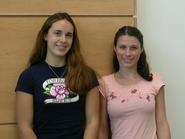
Chemistry majors Amanda Salisburg '08 and Katherine Alser '09 are working on an ongoing project in the computational chemistry lab under the advisement of the Winslow Professor of Chemistry George Shields and Visiting Assistant Professor of Chemistry Karl Kirschner. The project, involving the breast cancer-inhibiting alphafetoprotein, was started in the biology department about 10 years ago.
Alphafetoprotein is a naturally occurring protein that is produced by the fetal yolk sac and has been shown to inhibit estrogen-dependent breast cancer. Salisburg and Alser are using computer programs to model the molecule and look at a certain area that is known to be the active site. Using the computer, they can look at conditions that affect the chemistry of the peptide, including low-energy conformations, hydrogen bonding, torsion angles and the length of the molecule. "We're looking for the best conformation," said Salisburg, meaning the most stable and best at inhibiting breast cancer. The ultimate goal of the ongoing project is to turn alphafetoprotein into a drug form that can be used as a breast cancer treatment.
Salisburg worked on this project last summer and is looking forward to continuing her research, as is Alser, who is new to summer research. "In the past couple of years we have made some major strides," said Salisburg. "There is so much information; we just need to find time to get it done." The girls agree that there are pros and cons to coming into a project this far along. "I had to learn everything about the programs and catch up on the project," said Alser. "But its nice to have people close by who know what is going on."
Outside the lab, Salisburg competes in pole vault and the hurdles on the Hamilton track and field team and participates in community service, and Alser participates in Capoiera.
-- by Laura Trubiano '07
Posted July 20, 2006
